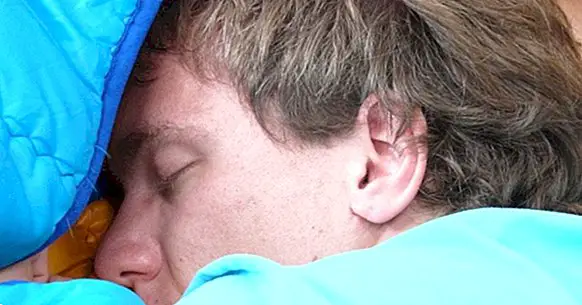Somniloquia: symptoms and causes of this parasomnia
Most people know someone who talks while they sleep. It is a simple emission of meaningless sounds, single words or even whole conversations in which the subject is even able to answer questions.
It may seem a strange phenomenon, but although it is understood as a sleep disturbance the somniloquia or somniloquio is highly frequent and it is not usually linked to severe problems. In this article, we briefly explore the concept and what it implies.
- Related article: "The 7 main sleep disorders"
What is somnilochia?
Somniloquia or somniloquio (both forms are correct) is a parasomnia, a disorder or alteration in which abnormal behaviors appear during the sleep period. Specifically in sleepiness the subject emits words during sleep with complete absence of voluntariness on their part.
The intensity with which you speak can vary greatly, ranging from whispers to real screams. They may also have signs of emotion, such as laughter or crying. These episodes in which the subject speaks usually do not last more than a few seconds or minutes, there being no subsequent memory of having spoken.
The content of speech is usually not intelligible, although sometimes you can get to emit words and even phrases with sense . Sometimes small monologues are established or it may even seem that they are talking to someone in a dream. And although in some cases people who perceive such speech may come to try to ask something to the subject asleep and this seems to respond, it is unlikely that responds directly to the stimulation.
Somniloquia is a very frequent phenomenon in children, being something normal although it may seem worrisome. It also happens in adults in an equally innocuous way, although in some cases behind it there may be some kind of problem or disorder (for example anxiety).
- Maybe you're interested: "The 5 phases of sleep: from slow waves to REM"
What produces it?
Although the process that causes people to talk during sleep is not known, and may appear during any phase of sleep, it can be speculated that the mechanism by which somnilochia appears is similar to the one that causes other parasomnias : a mismatch in the activation / inhibition of brain areas that occur during the different phases of sleep, especially in phases 3 and 4 of REM sleep and REM phase (moments when somnilochia usually appears).
For example, during REM sleep muscle tone is greatly reduced while physiological activity is elevated, but in people with somnilochia, the Brain areas that control buccofacial muscle activity remain active and allow the subject to speak in dreams. Something similar happens during deep sleep: muscle tone rises and sympathetic activity is reduced.
In what situations does it usually appear?
Somnilochia is very frequent throughout development, in children and adolescents. As we grow, however, it is becoming less frequent.
It is frequent that somniloquia appears associated with other sleep disorders , like the night terrors and the somnambulism. It can also appear before intoxication due to substance use, in febrile states and in times of high stress as well as in mental disorders such as mood, anxiety and some dissociative states.
- Related article: "Onirismo (dream delirium): symptoms, causes and treatment"
Effects of somniloquium
By itself the somniloquium is not harmful, but it can generate alterations at the social level in those people who sleep accompanied. For example, it can cause the partner or companion can not sleep properly or may appear words, names or comments that can be misinterpreted. O well can generate fear or concern in the environment (especially when there is crying, laughter or screaming).
Both this and the idea that something can be said wrong can cause some of the people who experience it can get to avoid contact with the couple during the night or sleep in the same room , which can lead to problems in the relationship.
Is treatment required?
Although it is considered a parasomnia or sleep disturbance, the somniloquium is not considered a pathology and usually does not suppose any real problem in the subject itself (although it can become a nuisance if the person sleeps accompanied). In general, therefore, it is not necessary to apply any type of treatment.
In spite of this, in cases where it is presented persistently or is annoying the use of relaxation and sleep hygiene is recommended , as well as create habits that allow an efficient rest.A good preparation of the environment before sleep is usually useful, as well as avoiding the use of stimulants during the hours before the sleep period.
It should also be borne in mind that sometimes the somniloquy is derived from the existence of affective or anxious problems, in which case the problems that originate them should be specifically worked on. It is also possible that the patient is afraid to sleep accompanied by the possibility of being a nuisance or saying something that causes problems with their partner, which may require treatment.
- Maybe you're interested: "Types of psychological therapies"



















